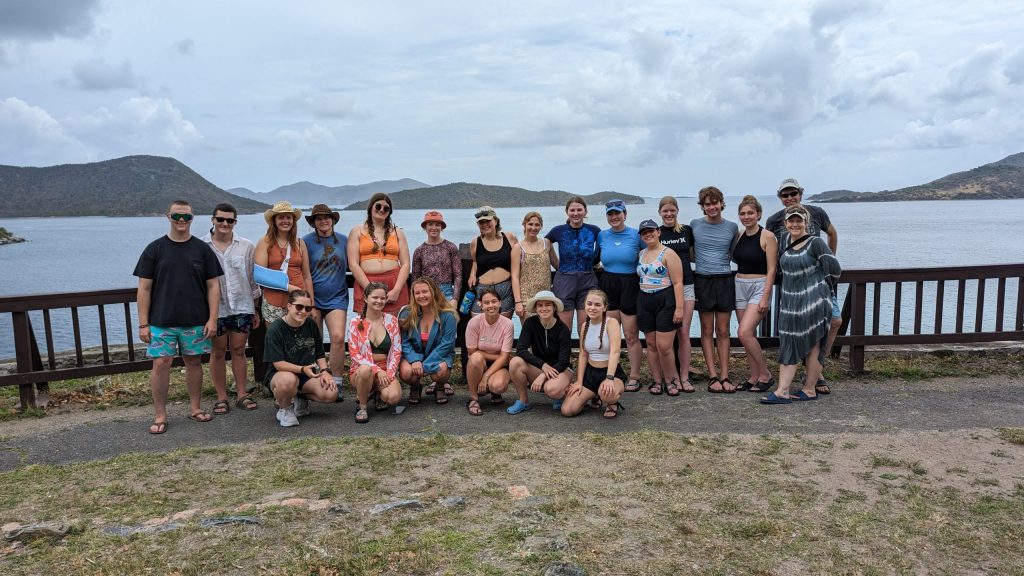Naess marks 20th trip with students to St. John to study coral reefs
September 7, 2023
For the past 20 years, students from UNC-Chapel Hill have traveled to St. John, the smallest of the three U.S. Virgin Islands, gaining first-hand experience studying the diverse marine ecosystem that surrounds the island.
The program began in 2002 as a collaboration between Greg Gangi, associate director for clean technology and innovation and teaching professor, and former student Sennai Habtes, a native of St. Thomas, USVI, with a goal of bringing UNC students to the islands. Brian Naess, a geographic information system (GIS) analyst and lecturer, who took over as lead instructor in 2020, recently returned from his 20th trip this summer, leading a group of 20 students on the nine-day trip, the field study portion of ENEC 259: Coral Reef Ecology and Management.
“Going on this trip to the same place for this long has let us see not only the consequences of climate change, but also the fact that reefs and coral are always trying to recover and always trying to survive and rebuild,” Naess shared.
ENEC 259 was built around the trip to St. John, according to Naess. The course’s primary goals include understanding the basic ecological processes and roles of coral reefs, mangroves and seagrass beds, identifying Caribbean reef organisms and learning about threats to coral reefs.
Although the introductory course is taught with an environmental focus, it is open to all majors and provides an opportunity to explore the outdoor world while gaining field experience.
Throughout the course, students are exposed to St. John’s vibrant marine life through daily snorkel trips to different parts of the island, two-thirds of which is a national park.
Sydney Hipp, a rising junior majoring in environmental science, shared her experience on the island.
“St. John is so beautiful, and it was so exciting to immerse myself in a particular ecosystem and become familiar with the species within,” she said.
Over the years, Naess has seen a number of changes in the marine ecosystem from major and minor coral bleaching events to recovery.
“Last year, there was a die-off in the long-spined sea urchin, Diadema antillarum, population,” Naess said. “This year, we saw plenty of urchins, and they all seem to be healthy. And so, I think the ones that survived were maybe stronger for it. We felt that was a pretty hopeful sign.”
Students note sightings of all species throughout the duration of the course. When they return to Chapel Hill, the list is compiled into a comprehensive species list, which includes all student sightings since 2002.
The course has been adapted over the years to provide students with the best possible learning experience.
The first trip to St. John took place during spring break of 2002, and ENEC 259 (formerly ENST 259) was introduced in the spring of 2003. The course was taught during the spring semester with the field study portion taking place over spring break until 2020.
When hurricanes Irma and Maria hit St. John in 2018, much of the island was destroyed, making it impossible to host the trip that year. In 2019 and 2020, the trip took place in San Salvador, Bahamas at the Gerace Research Center.
During the pandemic, Naess partnered with UNC Study Abroad to offer the trip as a maymester course through the Study Abroad office. The new program began in 2022 with a return to St. John for the first time since 2017.
Naess was glad to be back.
“When you have a place that you know, like a second home, you love to go back and see how much is still the same and kind of fits what you remember,” he said.
The Cinnamon Bay Campground, where the group stays during the trip, was renovated after the hurricane, receiving new tents and facility improvements. Students stay in a group campsite with tents housing four students each.
The close quarters and daily activities, including authentic West Indian meals and a sailboat trip around the island, allow students to build a close community, a unique part of the experience.
This year’s trip even featured a presentation about fisheries management and territory by Habtes, who received his Ph.D. after graduating from UNC and now works for the marine fisheries department of the Virgin Islands.
While the details of the trip have varied over the years, students can always expect an unforgettable experience.
“Take the trip. Just do it,” sophomore Micah Vollrath said. “Whether you’re an environmental major like most of my peers or a poli sci major like me, you’ll have the time of your life.”
Planning for next year’s trip is already in the works.
“As soon as I get home, I start thinking about the next trip,” Naess said. “I feel like there’s hardly a day that goes by where I’m not thinking about St. John and thinking about the trip and just looking forward to it. I want to keep doing it as long as I possibly can.”
Students interested in learning more about the program can visit the Coral Reef Ecology + Managment website or search for “coral reef” on the Study Abroad site: https://heelsabroad.unc.edu/index.cfm?FuseAction=Programs.SimpleSearch
Story by Natalie Peoples
Natalie Peoples is a UNC junior from Kensington, Maryland, pursuing a double major in journalism and environmental science. In addition to her work as a communications intern for the Institute for the Environment, she has experience in photojournalism and environmental research. Peoples plans to pursue a career in environmental journalism with a special interest in marine science.
